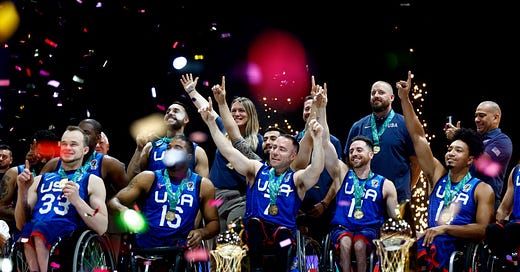IP Picks🔎: The Original Wheelchair Warriors
➕ 'Pride and Prejudice' meets reality TV, 'Boogie Nights' in the world of weed and the OG Clarice Starling

Welcome to The Optionist. As always, thanks for reading along. I hope everyone has a good Labor Day.
I was texting with a few writers and agents this week about a trend that I wanted to flag for you — the increasing tug-of-war between writers (mainly freelancers) and publications over the ancillary rights to stories. It is not entirely dissimilar to the conflict between the WGA and the studios. Publications have gotten increasingly possessive about those rights just as savvy writers have become shrewder about wanting to retain them.
Part of this conflict reflects the shrinking long-form journalism pie, thanks to the internet. There are fewer outlets, each with less resources, publishing fewer long-form pieces every year — the internet just can't monetize them. In a world where clicks are everything. Buzzfeed-syle listicles, stupid as they are, IMO, are just more lucrative. At the same time, cash-strapped publications trying to find every penny under the cushions see ancillary rights as a potentially valuable revenue stream. And the pay for journalists hasn't budged in years; if anything, it has shrunk. Even getting an option payment can make a huge difference in their income. Everybody is getting squeezed, everybody sees the money that comes from an option as a lifeline, and the money that does come — if something actually gets made — is treated like a lottery win.
The new owners of Los Angeles magazine, for example, have made their retention of secondary rights a non-negotiable condition in deals with freelancers. On the other side, some savvy writers are shopping screen rights now before placing the story with a publication, or getting their agents involved early on in what used to be pro-forma negotiations over a freelance piece. This conflict doesn't really affect buyers — you're going to deal with the rights holder, whoever that is — but it is definitely scrambling things in ways people should be aware of.
It's further mixing up a journalism hierarchy already shifting from the internet. As late as the early 2000s, the most likely place to find optionable journalism IP was in a handful of elite magazines — The New Yorker, Vanity Fair, Esquire, GQ, etc. — but that's not true anymore. Sure they still produce good journalism, but they don't have the same cultural reach as before, and aren’t making the same investment in long-form stories. Freelance writers with good Hollywood track records would've killed to be in them. But now the allure isn't as strong and they'll as likely go elsewhere.
Also, when the cultural conversation was narrower — think the magazine equivalent of three networks — it was easier to identify the buzzy watercooler pieces. Today a great piece might just as well light up a small corner of the internet. It takes a lot more work to find the good stuff and evaluate its wider appeal without the gatekeeping provided by big journalism. Evaluating a piece pre-publication is tricky and it takes a lot of confidence to snap up those rights.
There's more risk for writers as well. They have to invest time in developing a story without knowing if they'll get paid for it. And they have to hustle harder to sell the option, especially if they're circulating it before locking down an outlet to publish.
This is one of the reasons I’m a fan of new models of long-form journalism at places like Epic and Truly Adventurous. They’ve stepped in to fill the long-form void created by the decline of traditional magazines, incorporating secondary development (whether podcasts or docs or scripted) into their thinking from day one and have a transparent and equitable model for dividing the money.
To be honest, I'm not entirely sure how this is going to shake out. I expect more tension between writers and publications over rights (including more pushback from staff writers over getting a larger share of ancillary revenue generated by their work). I also expect more astute writers striking out in creative new ways and more experimentation from new outlets like Epic and Truly Adventurous. What it looks like in the end, I can’t predict.
On to this week’s picks, which include a cool biopic, an inspirational sports drama and a riff on Pride and Prejudice:
A dramatic true-crime procedural based on the career of the woman who inspired Clarice Starling.
A found-family dramedy set on the Irish coast about three strangers unexpectedly living together who unite to save a local landmark.
A biopic about the founder of High Times magazine.
A Pride and Prejudice-inspired dramedy set in L.A. that finds star-crossed lovers in a reality TV has-been and a hot Hollywood hunk.
An inspirational sports drama set in the world of wheelchair basketball.




